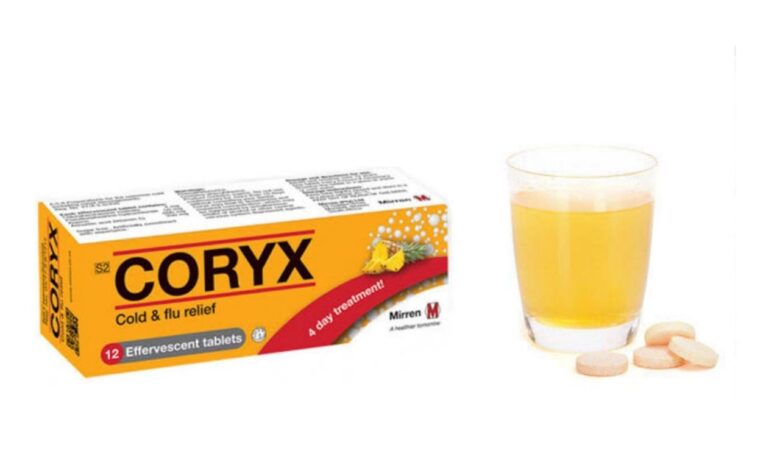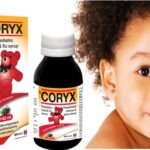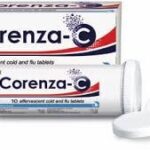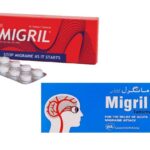Coryx Tablet: Ingredients, Uses, Dosage, Side Effects

What is Coryx?
Coryx Tablet is an effervescent tablet used for the treatment, control, prevention, & improvement of the following diseases, conditions, and symptoms:
- Flu
- Common cold
- Fever
- Pain
- Rheumatic fever
- Rheumatoid arthritis and other conditions
- Rheumatoid arthritis
- Pericarditis
- Kawasaki disease
- Scurvy
- Vitamin deficiency
- Allergy
- Hay fever
- Watery eyes
- Itchy throat/skin
- Anaphylactic shock
- Nasal congestion
- Upper respiratory allergies
- Sinus congestion and pressure
What are the ingredients in Coryx?
Each tablet of Coryx contains the following ingredients;
Aspirin 600mg: Aspirin is known as a salicylate and a nonsteroidal anti-inflammatory drug (NSAID). It was the first of this class of drug to be discovered. Aspirin contains salicylate, a compound found in plants such as the willow tree and myrtle. Its use was first recorded around 4,000 years ago. Hippocrates used willow bark for relieving pain and fevers, and some people still use willow bark as a natural remedy for headaches and minor pain.
Vitamin C 330mg: Vitamin C is a powerful antioxidant that can strengthen your body’s natural defenses. Antioxidants are molecules that boost the immune system. They do so by protecting cells from harmful molecules called free radicals. When free radicals accumulate, they can promote a state known as oxidative stress, which has been linked to many chronic diseases. Studies show that consuming more vitamin C can increase your blood antioxidant levels by up to 30%. This helps the body’s natural defenses fight inflammation.
Chlorpheniramine 4mg: Chlorphenamine, also known as chlorpheniramine, is an antihistamine used to treat the symptoms of allergic conditions such as allergic rhinitis. It is taken by mouth. The medication takes effect within 6 hours and lasts for about a day. Common side effects include sleepiness, restlessness, and weakness.
Pseudoephedrine Hcl 50mg: Pseudoephedrine is a sympathomimetic drug of the phenethylamine and amphetamine chemical classes. It may be used as a nasal/sinus decongestant, as a stimulant, or as a wakefulness-promoting agent in higher doses.
How does Coryx Tablet work?
Coryx works by suppressing the production of prostaglandins; both providing ascorbic acid and reversibly oxidizing to dehydroascorbic acid in the body; blocking H1-receptor sites on tissues; stimulating the alpha-adrenergic receptors.
How should I take Coryx Tablet?
Use Coryx Tablet exactly as directed on the label, or as prescribed by your doctor. Do not use in larger or smaller amounts or for longer than recommended. This medicine is usually taken only for a short time until your symptoms clear up.
Drop the effervescent tablets into a glass of water (at least 4 ounces, or one-half cup). Stir this mixture and drink all of it right away.
Call your doctor if your symptoms do not improve after 7 days of treatment, or if you have a sore throat that lasts longer than 2 days, or a fever with a headache, cough, or skin rash.
If you need surgery or medical tests, tell the surgeon or doctor ahead of time if you have taken this medicine within the past few days.
Store at room temperature away from moisture and heat.
What happens if I miss a dose?
Since Coryx Tablet is used when needed, you may not be on a dosing schedule. If you are on a schedule, use the missed dose as soon as you remember. Skip the missed dose if it is almost time for your next scheduled dose. Do not use extra medicine to make up for the missed dose.
What happens if I overdose?
Seek emergency medical attention or call the Poison Help line at 1-800-222-1222.
What are the side effects of Coryx tablet?
The following is a list of possible side-effects that may occur from all constituting ingredients of Coryx Tablet. This is not a comprehensive list. These side-effects are possible but do not always occur. Some of the side effects may be rare but serious. Consult your doctor if you observe any of the following side effects, especially if they do not go away.
• Angioneurotic edema
• Asthma
• Vertigo
• Nausea
• Vomiting
• Dyspepsia
• Coryx Tablet may also cause side-effects not listed here.
If you notice other side effects not listed above, contact your doctor for medical advice.
Note: Coryx Tablet contains aspirin which can irritate your stomach lining and can trigger gastrointestinal upset, ulcers, and bleeding. And, because it thins your blood, it can be dangerous for people who are at higher risk of bleeding.
What medications can interact with Coryx Tablet?
An interaction may involve one medication making another less effective or the combination being dangerous.
Coryx Tablet can interact with many drugs. Some of these include:
- Anti-inflammatory painkillers: Examples include diclofenac, ibuprofen, and naproxen. Combined with aspirin, these types of drugs can increase the risk of stomach bleeding.
- Selective serotonin reuptake inhibitors and other antidepressants: Examples include citalopram, fluoxetine, paroxetine, venlafaxine, and sertraline. In combination with aspirin, any of these can increase the risk of bleeding.
- Warfarin: In combination with this blood thinner, aspirin can reduce the drug’s anticoagulant effects and increase the risk of bleeding. There are situations, however, when this combination may be beneficial.
- Methotrexate: In combination with this drug, used in the treatment of cancer and some autoimmune diseases, aspirin can make the drug harder to eliminate, potentially resulting in levels of methotrexate that are toxic.
For a more complete list of drug interactions, check with the National Institute for Health and Care and Excellence.





